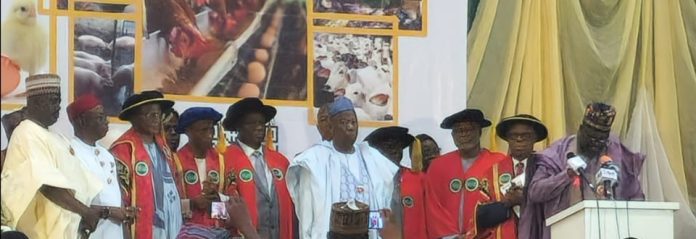The Federal Government has expressed concern over the negative impact of climate change on livestock production in the country.
Minister of State for Agriculture and Food Security, Aliyu Abdulahi, made this known at the 12th Animal Science Association of Nigeria (ASAN) and the Nigerian Institute of Animal Science (NIAS) Joint Annual Meeting and 28th ASAN Conference on Tuesday in Abuja.
The minister, who expressed deep concern over the impact of climate change in the whole nation’s agriculture sector, said Northern Nigeria is “hounded by desert encroachment on once arable land, while Southern Nigeria is pounded by the rising tide of coastal flooding and erosion.”
Aliyu said the country must come to grips with not only mitigating climate change but raising its level of preparedness by putting in place policies and strategies that support climate smart agriculture.
The minister said for Nigerians to have access to balanced and wholesome diet, the livestock sub-sector of the economy must be made viable enough not only to provide affordable source of protein but also create employment and earn foreign exchange for the country.
READ ALSO : Gunmen murder kidnapped priest after collecting ransom in Kogi
He, however, expressed the readiness of the President Bola Tinubu-led administration to address the problems besetting the agriculture sector and ensure food security.
“This is the essence of State of Emergency on Food Security as declared by the President and Commander-in-Chief of the Armed Forces of the Federal Republic of Nigeria, His Excellency, President Bola Ahmed Tinubu GCFR on 13th July 2023,” he said.
He said the Federal Government has also put in place several programmes to enhance the livestock sector.
“The National Livestock Transformation Plan, NLTP, meticulously being implemented by the ministry is a testament to the commitment of the present administration to create a robust, vibrant and competitive livestock sector capable of meeting the national demand for animal protein and place Nigeria among top players in the global livestock economy, ” he said.
Also speaking at the event, which had its theme as ‘Pathway to Addressing the Challenges of Climate Change in Animal Agriculture’, National Chairman of the All Progressives Congress (APC), Dr. Abdullahi Umar Ganduje, called on relevant stakeholders to leverage on research and innovation to boost the nation’s livestock sub-sector.
Delivering a keynote address titled : “Towards a Sustainable Livestock Production System for National Economic Development”, Ganduje, who was the chairman of the occasion, called for development of new variety of maize that will be meant exclusively for poultry, monogastric and dairy feed.
According to Ganduje, improved feeds and feeding programmes are important components of sustainable production systems, in order to optimize productivity and efficiency, digitization and decision support tools can support farmers in better management of their livestock.
” It is obvious the livestock sector is critical component of our economy that should be taken seriously especially considering Mr President’s food security agenda and economic growth plan. Therefore, we should pay attention to the following:
“Our nation has to pay full attention and commitment to research and innovation as twin tools for the development of our livestock. We advocate a Triple Helix Model that loops Research/Innovation with Industry/Development and Government Policy.
“Research is expected to support the development of animal agriculture in many ways, perhaps the most important being, the enhancement of livestock productivity which leads to a more efficient utilization of available resources;
“Strategies should therefore embody adequate economic returns to livestock farmers; maintenance of natural resources and productivity; minimal adverse environmental effects through climate smart production practices; optimal production with minimal external inputs; and satisfaction of human food and income needs, as well as, rural families’ social needs;
“Areas requiring attention for R and D include i) farm system approach, ii) Feed (arid zones, semi-arid and sub humid zones, highlands, humid zones), iii) health and iv) genetic improvement; development of new variety of maize that will be meant exclusively for poultry, monogastric and dairy feeding. This will be a viable and more sustainable option to importation of the required grain, to save the collapsing poultry industry, a sub-sector that is worth about N1.6 trillion, according to the CBN (2019). It is important to note that this represents about 25% contribution to the agricultural GDP;
“R and D is also most urgently needed in the development of new breeds of cattle for increased meat and milk production, poultry strains that are resistant to heat stress, as well as, sheep and goats for improved hides and skin. Also, there more pressing need for genetic improvement of indigenous breeds of all livestock species for resistance to all endemic diseases for a sustainable national livestock production system.”
On his part, President of the Nigerian Society for Animal Production (NSAP), Prof. Francis Abeke, advocated deliberate policies to address the negative impacts of climate change on livestock production.
Abeke said the negative influence of climate change on animal agriculture could not be over emphasised and called for more science, smart science, and cutting edge technology to reposition the sector.
According to him, the society is committed to meeting the yearning needs and aspirations of Nigerians for adequate animal protein in their diets.
“I want to call on all tiers of government to redouble their efforts in providing suitable production environment through policies, as well as improving the funding of this important sector of the economy.
“The current low scale and almost subsistent production system cannot meet the animal protein need of the vast and growing population of Nigerians and for export.
“I strongly believe that as we put on our thinking caps and brainstorm on the various challenges facing the livestock industry during this conference; we will come out with a workable solution,’’ he said.
On his part, Prof. Baba Yusuf, President, Nigerian Institute of Animal Science, said food and nutrition security was very critical and central to the Renewed Hope Agenda of the Federal Government.
He said NIAS as a regulatory body in the livestock sub-sector, would continue to strive to be very innovative, strategic and transformational.
Yusuf pledged the Institute’s commitment to work with all stakeholders from Government, Academia and, particularly, the industry, in order to be more impactful.
“As animal scientists, we must make extra efforts towards building bridges of hope, tolerance, cooperation and unity across our profession.
“This is the only way for Animal Agriculture to fully unleash its potential and relevance towards the economic growth of our country,’’ he said.
Highpoint of the event was the induction of Ganduje as Associate Fellow of the Nigerian Institute of Animal Science as well as oath taking by other new associate members.
























